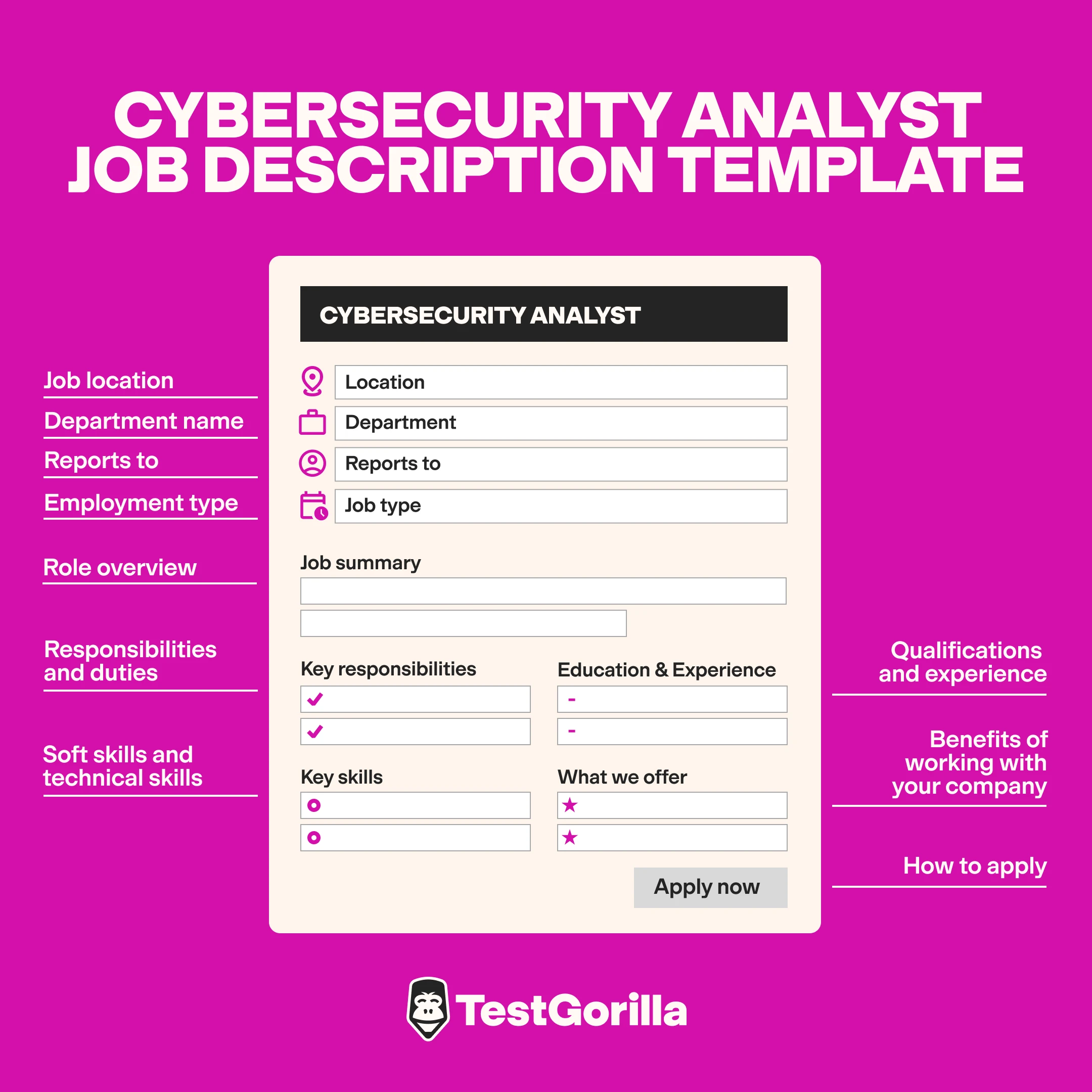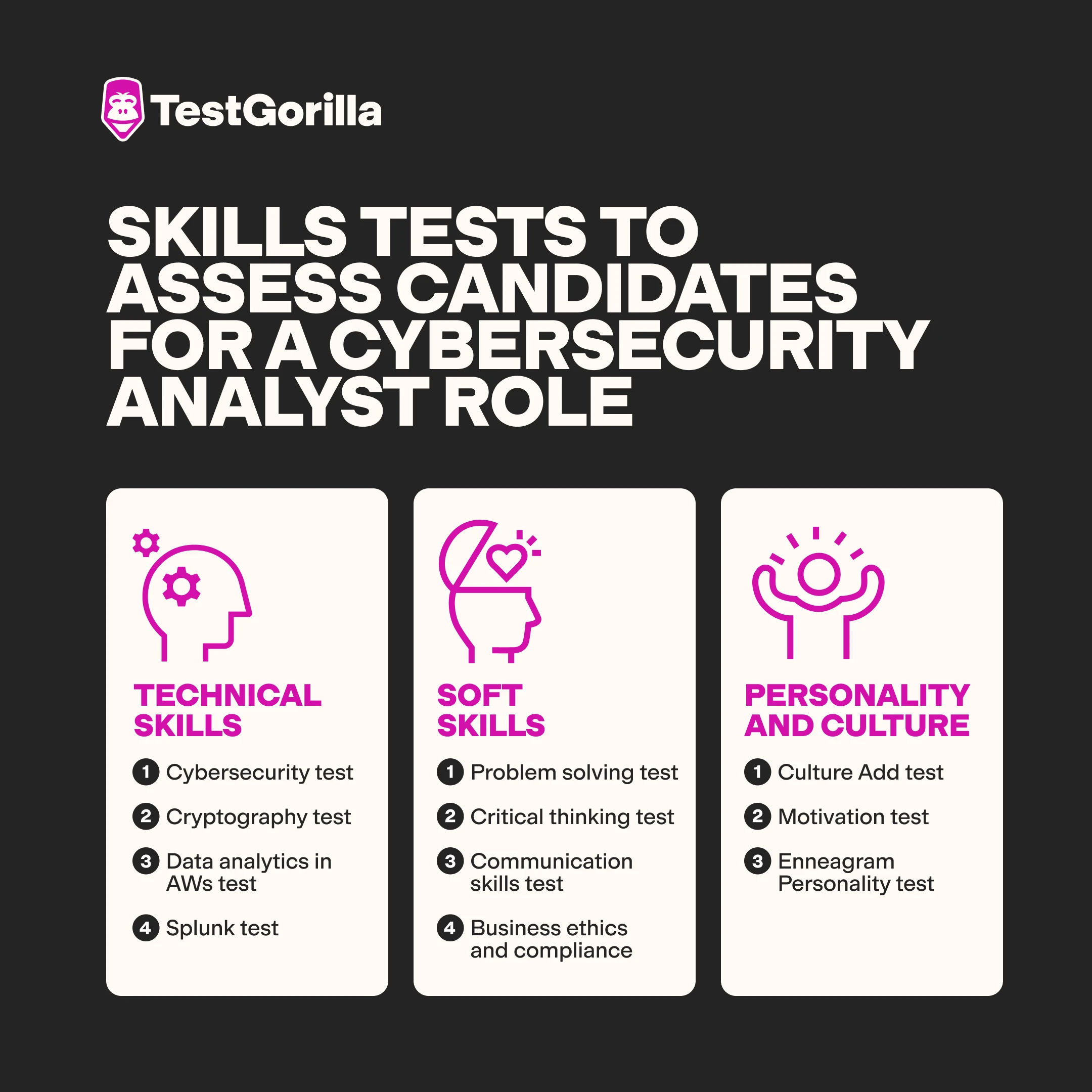Cybersecurity analyst job description template: Everything you need to include
Finding a cybersecurity analyst isn’t always easy. With talent shortages and soaring demand across the IT sector, the race to attract the best candidates has never been more competitive.
It’s also important to highlight the right skills – both technical and soft – to attract professionals who can work with the security frameworks, networks, and software your organization relies on.
That’s where an engaging, effective job description makes all the difference.
In this article, we provide a step-by-step template to help you get started. You can use it as the foundation for a strong hiring strategy and a skills-based approach to finding the right person for the role.
Cybersecurity analyst job description template
Job Title: Cybersecurity Analyst
Location: [City, State/Remote]
Department: [Department Name]
Reports To: [Manager/Supervisor Title]
Job Type: [Full-Time/Part-Time/Contract]
Job Summary
About the Role
We are seeking a dynamic and skilled Cybersecurity Analyst to protect our systems, networks, and data from cyber threats. You will play a key role in identifying vulnerabilities, implementing security measures, and responding to security incidents.
This is the ideal opportunity if you have an analytical mindset, a passion for cybersecurity, and the ability to think like an attacker!
Responsibilities
Monitor, detect, and analyze potential security threats and vulnerabilities in real time.
Investigate security breaches, conduct forensic analysis, and provide remediation strategies.
Implement, test, and improve security protocols, including firewalls, IDS/IPS, SIEM, and endpoint protection.
Assess risks and perform security audits to ensure compliance with industry standards (e.g., ISO 27001, NIST, GDPR).
Analyze logs and security alerts to identify patterns of suspicious activity.
Develop and enforce security policies and best practices across the organization.
Train employees on cybersecurity awareness and best practices.
Stay updated on emerging threats, vulnerabilities, and cybersecurity trends to recommend proactive defenses.
Requirements
Technical Skills:
Proficiency in SIEM tools (Splunk, QRadar, etc.), firewalls, IDS/IPS, and endpoint security.
Strong knowledge of network security, penetration testing, and vulnerability assessment tools (e.g., Nessus, Wireshark, Metasploit, Burp Suite).
Experience with cloud security (AWS, Azure, GCP) and endpoint protection solutions.
Familiarity with forensic analysis, malware analysis, and incident response frameworks.
Understanding of encryption, authentication, and security protocols (SSL/TLS, SSH, PKI, etc.).
Soft Skills & Work Approach:
Analytical and critical thinking skills with attention to detail.
Ability to work under pressure and respond quickly to security incidents.
Strong problem-solving and investigative mindset.
Excellent communication and documentation skills.
Proactive, self-motivated, and continuously learning about new cybersecurity threats.
Education & Experience:
Bachelor’s degree in Cybersecurity, Information Technology, Computer Science, or a related field (or equivalent experience).
X+ years of experience in cybersecurity analysis, threat detection, or security operations.
Why Join Us?
Skill-Based Hiring: We assess candidates based on skills, not just resumes.
Challenging & Impactful Work: Protect critical systems from cyber threats.
Inclusive Culture: We value diversity, transparency, and equal opportunities.
Professional Growth: Access to training, certifications, and mentorship in cybersecurity.
If you are a cybersecurity enthusiast who thrives on protecting organizations from cyber threats, apply today and help us build a secure digital future!
Application Instructions
To apply, please submit your resume, cover letter, and portfolio (if applicable) to [email/website link].
Deadline: [Insert Application Deadline]
[Company Name] is an Equal Opportunity Employer. We celebrate diversity and are committed to creating an inclusive environment for all employees.
Why this cybersecurity analyst job description template works
We designed this template to attract candidates with the cybersecurity skills needed for an analyst role.
Job information
This introductory information lets candidates quickly see whether the role meets their practical requirements, including location (as some analysts look for fully remote work) and job type, which is relevant in an industry with many contract workers.
Job summary and responsibilities
The “About the role” and “Responsibilities” sections expand on what candidates can expect from the role. Here, you can specify whether you’re looking for a generalist or specialist analyst, such as a malware or risk and compliance analyst.
Requirements
This section focuses more on the necessary technical skills than qualifications. This balance is ideal because technical skills are the foundation of cybersecurity roles. Analysts work with various programs, networks, and frameworks to keep an organization’s technology and data secure.
To ensure you attract candidates with the right expertise, you can outline the specific cloud security tools, frameworks, and security protocols your company uses.
The template also lists relevant soft skills cybersecurity analysts need to thrive in their roles. For example, communication skills are essential for translating highly technical concepts into easy-to-understand language.
Of course, not all cybersecurity analysts have formal qualifications and instead develop their skills on the job. That’s why we’ve saved mentioning education and experience until the end of this section. It reflects reality and reinforces that you’re seeking candidates with the right skills above all else.
Why join us?
The final section puts the spotlight on company culture, professional development opportunities, and the importance of the role. This is an opportunity for you to highlight what sets you apart from other employers to attract the best talent in a competitive sector. It’s a good place to mention remote opportunities, which cybersecurity analysts often seek.
The best insights on HR and recruitment, delivered to your inbox.
Biweekly updates. No spam. Unsubscribe any time.
Next steps: Attracting and assessing cybersecurity analyst candidates
Using our template, you can craft a job description to attract top cybersecurity talent. After receiving applications, you need to identify and shortlist candidates for interviews.
Talent assessments are one of the best – and fairest – ways to do this. They provide detailed insights into candidates’ hard and soft skills, enabling you to compare and shortlist candidates objectively based on their capabilities.
TestGorilla’s easy-to-create and use assessments are designed precisely for this. With a library of 400+ scientifically validated tests, you can combine up to five tests to create a custom assessment for your cybersecurity analyst roles.
Our collection of cybersecurity tests lets you measure various hard and soft skills, as well as personality and culture, to find analysts who fit in seamlessly and stay.
To assess candidates for a cybersecurity analyst role, you could include the following tests:
Technical skills
Cryptography test
Splunk test
Soft skills
Critical thinking test
Business ethics and compliance
Personality and culture
Motivation test
Try TestGorilla today by creating a free account or registering for a free live demo.
FAQs
What does a cybersecurity analyst do?
Cybersecurity analysts protect a company’s technology and data from malicious attacks and other breaches. They do this by setting up security software to safeguard data and systems, monitoring an organization’s networks for potential vulnerabilities, and responding to security breaches. Analysts may also be responsible for providing cybersecurity training to employees.
Is cybersecurity high-paying?
Cybersecurity roles are often highly paid. However, pay varies depending on an employee’s experience, the role's responsibilities, and the skills required. For example, the average salary for an entry-level cybersecurity analyst is around $50,000 a year, while more experienced analysts can earn upwards of $200,000 a year.
Does cybersecurity require coding skills?
Some cybersecurity analyst roles – like specialist or more senior roles – may require candidates with some coding abilities. Even if the role doesn’t need it, it’s often helpful for cybersecurity analysts to have a basic understanding of languages like Python to help automate and improve cybersecurity.
Do cybersecurity analysts work from home?
The nature of cybersecurity allows some analysts to work from home while others are required to be in the office. This varies depending on the role’s requirements, employer policies, and industry regulations. For example, analysts who need to install security software on physical devices may sometimes be required to work onsite.
Do cybersecurity roles need math?
Cybersecurity analyst roles rarely require mathematics as a stand-alone skill. However, as cybersecurity analysts work with computer programs and coding, a basic knowledge of mathematics is helpful. For instance, it helps analysts understand encryption techniques and the principles of cloud engineering.
Related posts
You've scrolled this far
Why not try TestGorilla for free, and see what happens when you put skills first.
















